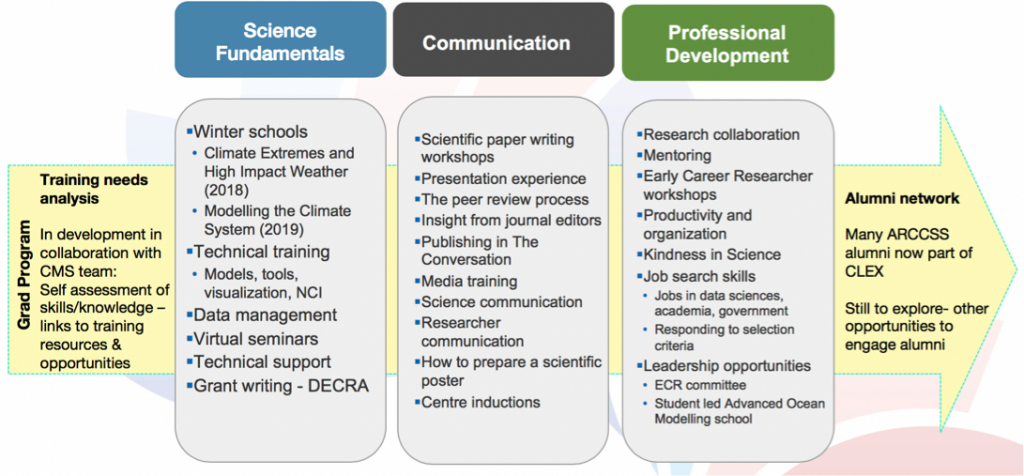by Melissa Hart
For this newsletter I thought I’d give you a high level overview of the CLEX Research Development Program. This is the type of information I share at our centre inductions, (a reminder the next one is April 5), but I thought many of you may appreciate a refresher.
The Researcher Development program includes fundamental research and communication skills, professional development, mentoring and leadership opportunities and involves all Centre researchers. They key here is – all researchers. In ARCCSS my focus was on our grad students, however in CLEX I have recognised that development opportunities are key to ensure that all centre researchers, but in particular our ECRs on short-term contracts, realise their intellectual, technical and professional capacity required for their ideal career path.
The Researcher Development Program
The Program consists of three pillars – science fundamentals, communication, and professional development.
- Science fundamentals includes annual graduate-level climate science winter schools, a library of online resources including virtual lectures, expert seminar series, grant and fellowship writing support, technical training in key models and programming languages, and data management skills.
- Communication includes training in scientific paper writing, publishing and profile building, and media and presentation skills.
- The Professional Development component involves mentoring and leadership opportunities for researchers. It is also for early-mid career researchers to have opportunities to co-lead research programs and to lead research and outreach activities.
Components of the Researcher Development Program are informed by industry and other stakeholders, so that our graduates and researchers are equipped to transition their research into various sectors.
The figure below shows what the program looks like in practice thus far.

Graduate Program
With more than half of university research coming from PhD students, within the Centre we realise the vital importance in investing in a graduate program that that combines breadth, depth, support and collaboration.
The Researcher Development framework is structured so postgraduate and honours students follow a path nested within the researcher development program. This builds on the success of the ARCCSS Graduate Program, which trained over 120 higher degree research students from over 20 countries.
Climate science students come from a range of undergraduate backgrounds, including mathematics, physics, engineering, and environmental sciences, and bring a variety of skills and knowledge. Therefore the Graduate Program is developed so that it can be tailored to individual student needs and students can join training opportunities as and when they need them. The cornerstone of the Graduate Program are our annual winter schools. These winter schools offer breadth of knowledge and opportunities for networking with the Australian climate science community.
Collaborations are a key to building research capacity and a vital component in researcher development. Therefore we encourage joint supervision across institutions, including partner organisations, and you are all encouraged to spend time at multiple institutions.
Components of the graduate program can be packaged into formal, recognised programs and counted towards coursework requirements at those nodes that have formal PhD coursework.
All of this means that our students graduate with a broad range of discipline specific and transferable skills.
